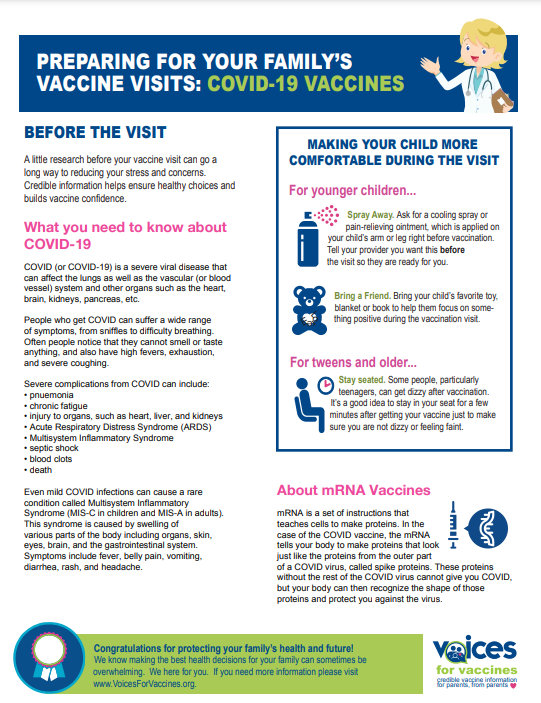COVID-19 Vaccines
What is COVID-19?
COVID (or COVID-19) is a severe viral disease that can affect the lungs as well as the vascular (or blood vessel) system and other organs such as the heart, kidneys, pancreas, etc.
COVID is caused by a type of coronavirus called SARS-CoV-2. Coronaviruses are a large family of viruses responsible for diseases, such as SARS and MERS which caused deadly outbreaks across China and Northern Africa, and are also responsible for several milder strains of the common cold.
What are the risks of COVID-19?
People who get COVID can suffer a wide range of symptoms, from sniffles to difficulty breathing. As the virus mutates, risks and side effects can vary. With some variants, loss of smell or taste is common. Other mild to moderate symptoms include fevers, body and muscle aches, exhaustion, nausea and vomiting, and severe coughing.
Severe complications from COVID can include:
- pneumonia
- injury to organs, including the heart, liver, and kidneys
- Acute Respiratory Distress Syndrome (ARDS)
- septic shock
- blood clots
- Long COVID
- death
In younger patients, even mild COVID infection can cause MIS-C, or Multisystem Inflammatory Syndrome in Children in rare cases. This syndrome is caused by swelling of various parts of the body, including organs, skin, eyes, brain, and the gastrointestinal system. Symptoms include fever, belly pain, vomiting, diarrhea, rash, headache, and confusion.
Long COVID or Post-COVID Conditions (PCC):
Some people who have had COVID can experience long-term effects from their infection, often called long COVID.
- Symptoms vary and can last weeks, months, or longer.
- Occurs more often in people who suffered severe COVID-19 illness, but even those with mild or asymptomatic COVID could develop Long COVID
- People who are unvaccinated against COVID may have a higher chance of developing long COVID than those who were vaccinated
- Symptoms include extreme fatigue, ongoing shortness of breath, brain fog, headaches, depression, anxiety, joint pain, and other physical difficulties that interfere with daily life.
How does the COVID-19 vaccine work?
All vaccines work in the same way: they present to your body proteins to teach your immune system to attack and get rid of these. Because these proteins appear to be similar to the actual virus, your body will remember how to attack them and be able to protect you from the real virus if it comes across it.
COVID vaccines bring these practice proteins into your body in one of these ways:
- mRNA Vaccines: mRNA is a set of instructions that teaches cells to make proteins. The vaccine uses mRNA that tells your body to make spike proteins that look just like the proteins from the outer part of a COVID virus. These proteins without the rest of the COVID virus cannot make you sick. Your body can then recognize the shape of those proteins and protect you against the virus, which also carries proteins with the same shape.
- Inactivated Vaccines: these are similar to many other vaccines available today, such as inactivated flu vaccines. They use an inactivated (dead) virus as an antigen to teach your immune system what the real virus looks like. Because the virus in this vaccine is dead, it cannot cause disease.
- Viral Vector Vaccines: These vaccines use a harmless virus (vector) that cannot make you sick to act like a COVID virus. This antigen will enter a cell in your body and tell your body to make spike proteins that look just like those from a real COVID virus. These proteins without the real COVID virus cannot make you sick. But your body can then recognize the shape of those proteins and protect you against the virus, which also carries proteins with the same shape. In the US, viral vector vaccines are not available.
What are the risks and benefits of the COVID-19 vaccine?
Over 12 billion doses of COVID-19 vaccine have been given to people across the world, which gives us a lot of information about the true risks and benefits of vaccination.
Common side effects:
- swelling, redness, and pain where the vaccine was given
- fever
- headache
- tiredness
- muscle pain
- chills
- nausea
It is very rare for someone to have a serious reaction to the vaccine, but it is possible to have a severe allergic reaction or other rare reaction.
- Myocarditis and pericarditis, or inflammation of the heart or lining of the heart, can be rare side effects of mRNA vaccines. Symptoms can include chest pain, shortness of breath, and feelings of having a fast-beating, fluttering, or pounding heart. This side effect is more common in adolescent or young adult males than in other groups. This is usually mild and goes away on its own. It is also important to note that the risks of myocarditis and pericarditis are much higher after COVID infection than it is for the vaccine, and can be more severe.
- Thrombosis with Thrombocytopenia Syndrome (TTS), a type of blood clotting problem, is a rare side effect of viral vector vaccines, which are not used in the US. This type of blood clot, and blood clots in general, is not a side effect of the mRNA vaccines.
What can I expect at a COVID-19 vaccine appointment?
A little research before your vaccine visit can go a long way to reducing your stress and concerns. Credible information helps ensure healthy choices and builds vaccine confidence.
COVID-19 Fact Sheet
Download and print our COVID-19 fact sheet to find out what to expect at your appointment.
Where can I get more information about the COVID-19 vaccine?
Learn more about COVID-19:
How do I know this information is credible?
We work for parents so we make sure that parent concerns are addressed using facts and science and our content is reviewed by experts who have spent their careers studying vaccines. Learn more about how we ensure we are bringing you the best information to help you make healthy choices for your family.




